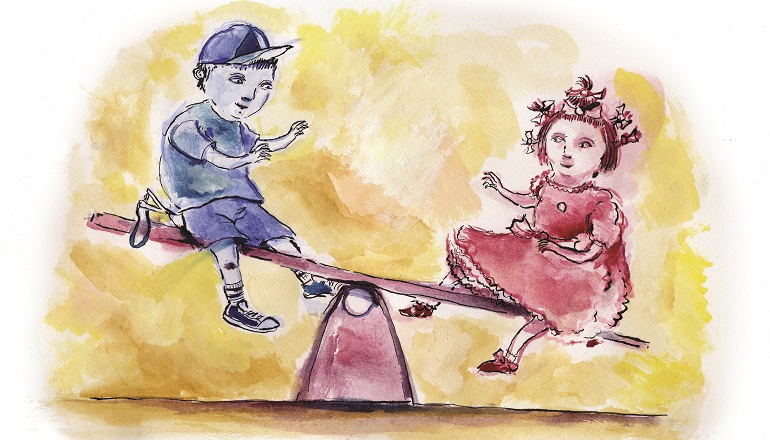The road to adoption is full of decisions: International or domestic? Agency or attorney? Baby or waiting child? Same race or different race? And many adoptive parents-to-be make another decision: They want to choose the sex of their new child. And overwhelmingly, if given the opportunity, prospective adoptive parents choose girls. “About 80 percent of prospective parents will choose a girl, rather than adopt a boy,” says Susan Myers, director of the Lutheran Adoption Network.
There are dozens of reasons given for this preference, in combinations unique to each family. Sometimes, they already have sons, and want to have the experience of raising a daughter; or they already have daughters, and would feel most comfortable with another girl. “As the parent of two boys, we are thrilled about the option of having a daughter in our family,” says Susan Schmidt. “If we were not able to choose the gender, I am not sure I would have gone down this road.” Some families believe that a daughter will be easier to raise than a son, and more likely to be cuddly than a rough-and-tumble boy. And for single mothers, who overwhelmingly choose girls, it often comes down to the lack of a male role model for their child. “I chose to adopt a girl,” says Kim Gold. “I know that I will not always be able to help her or even understand her, but I can at least relate. Without male role models, I didn’t feel it was fair to adopt a boy.”
But the requests for a girl create a quandary for the attorneys and agencies who facilitate adoptions. They want to respect the adoptive parents wishes, but they also want to find good homes for thousands of children waiting for families in the U.S. and around the world. And the desire for daughters has led to a situation where healthy boys often wait much longer to find families—or miss the opportunity entirelywhile healthy girls are in short supply. “Agencies and orphanages end up with so many little boys waiting and waiting, with nothing wrong except they weren’t born female,” Myers says.
[Expert Audio: Adoption Costs—What to Expect and How to Meet Them]
Domestic Adoption: A Difficult Issue
In the U.S., where most adoptive parents are matched with a birth mother before the child’s birth, and the relationship that develops is paramount, requesting a girl can be problematic, at best. Most adoption attorneys and agencies will not accommodate a gender preference. “I’m always taken aback by that request,” says Peter Wiernicki, an adoption attorney in Rockville, Maryland. “You don’t get to choose biologically, and I think it’s fraught with problems in domestic adoption. You have to be honest and build a relationship with the birth parents who are looking to place their child with you, and a sex preference can hinder that. It takes an already challenging process and makes it even more challenging.”
Many agencies agree, and refuse to entertain gender requests from parents. “You cannot go to a birth mother and say, ‘So-and-so will adopt your baby as long as it’s a girl’,” says Jane Page, director of adoption services for The Cradle, in Evanston, Illinois. “In open adoptions, you cannot allow for gender preference. Most families are fine with that.”
But there are some adoption professionals who are willing to honor a gender preference. “I ask clients who say they want a particular sex if that’s a mandate or a preference,” says adoption attorney Diane Michelsen of Lafayette, California, who estimates that about 15 percent of her clientele come in wanting a particular sex. “If it’s a mandate, this isn’t the right vehicle.” She steers the clients who want a guarantee toward international adoption or to one of the handful of lawyers who work with clients who insist on a boy or a girl.
For those willing at least to consider a child of either sex, she will show their information only to birth mothers who have had an ultrasound or sonogram that indicates that the child is the sex they wanted. This usually results in a longer wait—and a surprise if the prenatal information was incorrect. But Michelsen has had only one family back out because of the child’s sex in 26 years of practicing adoption law. “This is a hard issue,” Michelsen says. “I don’t feel that I can fault someone for their feelings. But birth parents want to connect and be comfortable with the family, and it’s very hard if they connect with a family who won’t raise the baby.”
Bethany Christian Services, a network of adoption agencies based in Grand Rapids, Michigan, allows some gender preference in domestic adoptions. If parents insist on a girl, their profile is shown only to birth mothers who have already given birth or who have a clear ultrasound. “We try to accommodate their wishes if it’s a strong preference, but we encourage the families to assess their motivation,” says Kris Faasse, the national adoption consultant for Bethany. “Many birth mothers don’t want to consider a family with a strong preference. A birth mother doesn’t want her child to be someone’s second choice.”
[Your Guide to Learning About Adoption Online]
International Adoption: The Right to Choose
In the international adoption process, where parents are matched with waiting children, it’s easier to consider requests regarding sex, health, or other characteristics, depending on the policies of a particular country. But that doesn’t mean that adoption professionals agree with the idea of sex selection—or that they allow their clients to make that choice. “Adoption should be primarily about finding homes for children who need homes, not about fulfilling requirements that parents have,” says Vicki Peterson, director of Wide Horizons Adoption Agency in Waltham, Massachusetts, which has a policy not to allow childless parents to request a specific sex from any country but China. “When a family is adamant about the child’s sex, you have to wonder what’s motivating that,” says Bruce Mossburg, director of adoptions for international services at Bethany Christian Services, which does allow parents to express a gender preference when a country allows it. “You have to wonder about their rigidity.”
In many countries that allow parents to request their child’s sex, the wait increases considerably if you request a healthy infant girl—often to double the wait for a healthy infant or toddler boy, according to agency estimates. But many families will wait as long as it takes, even passing up the immediate referral of a baby boy.
Many agencies we spoke with tried to steer parents who were adamant about a daughter into their China programs, since about 95 percent of referrals from China are for infant or toddler girls. “It’s clear that if you only want a girl, the China program is the best choice,” says Lisa Vertulfo, Holt International’s senior executive for the U.S. region. “If somebody doesn’t want to change, its a bad idea to force them into parenting a boy.”
[Parent-to-Parent: My Best Advice to Myself]
The Consequences
The demand for daughters means more than longer waits for adoptive parents. For many young boys around the world, it means spending years—or even entire childhoods—in orphanages or foster care. “It’s really sad that being male is a handicapping condition,” says Becky Steeber, adoption and social work supervisor for Childrens Home Society and Family Services in St. Paul, Minnesota.
“If it was just about parents getting a preference, it might not matter so much, but this really affects children,” Mary Ann Curran, director of social services at WACAP, says. “It makes the wait dramatically longer for boys. You see little boys waiting for homes who shouldn’t have to wait, and families cheating themselves out of getting a child sooner.”
Even after expressing a preference for a daughter, some families find themselves getting something unexpected—the referral of a boy. As many of the families in this situation have discovered, while they may initially have wanted a daughter, they’re extremely happy to have a son. “We really wanted a girl and knew that, by choosing China, we would be assured one,” says Barb Ridenour. “But as fate would have it, our agency had three boy placements, and ours was the third. Once we had the referral, there was a little boy waiting for us, and we loved him so much. Having a girl seemed much less important than adopting this child.”



